#reaganomics
Explore tagged Tumblr posts
Text
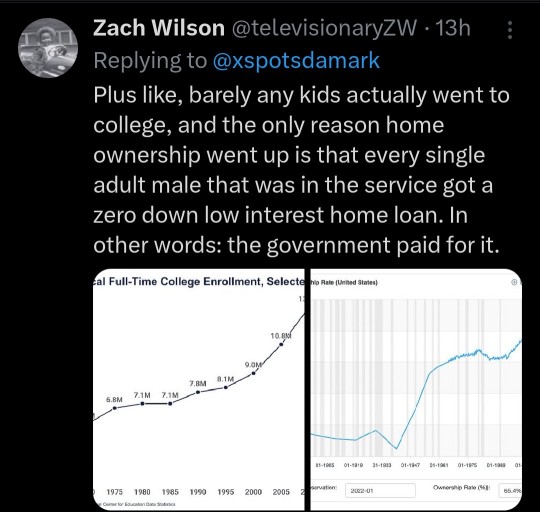

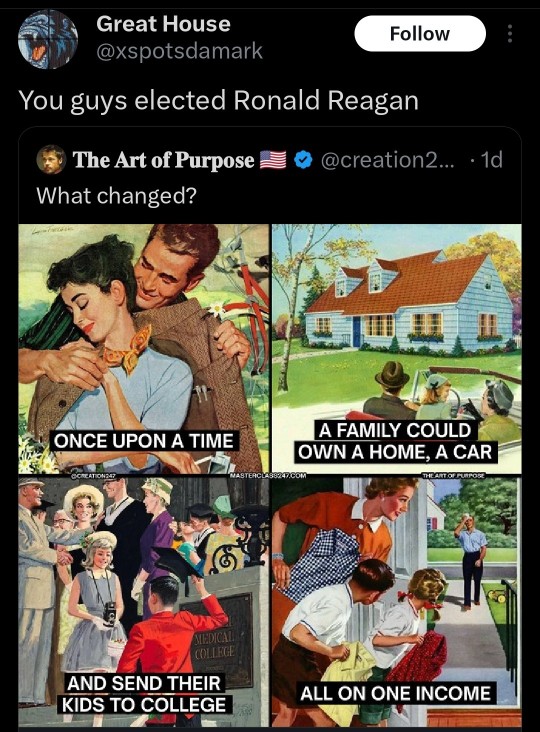
12K notes
·
View notes
Text
The housing crisis considered as an income crisis
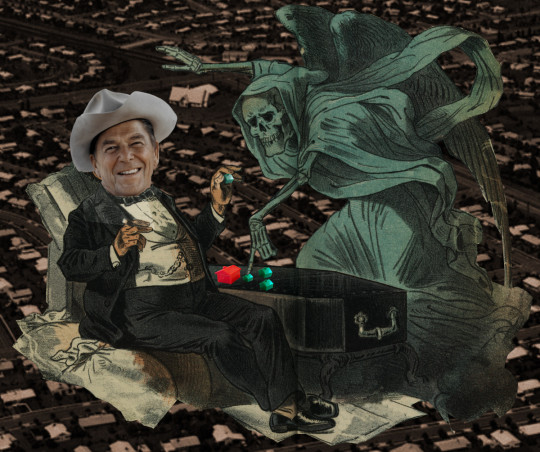
I'll be in TUCSON, AZ from November 8-10: I'm the GUEST OF HONOR at the TUSCON SCIENCE FICTION CONVENTION.

A paradox: in 1970, everyday Americans found it relatively easy to afford a house, and the average American house cost 5.9x the average American income. In 2024, Americans find it nearly impossible to afford a house, and the average American house costs…5.9x the average American income.
Feels like a puzzler, right? Can it really be true that the average American house is as affordable to the average American earner as it was in 1970? It is true, as you can see from Blair Fix's latest open access research report, "The American Housing Crisis: A Theft, Not a Shortage":
https://economicsfromthetopdown.com/2024/10/23/the-american-housing-crisis-a-theft-not-a-shortage/
Fix also points out that is even more true of rents than it is of house prices. The ratio of rent to average income has actually fallen slightly since 1970. Rents are also, in some mathematical sense, "affordable."
Now, those of you who are well-versed in statistical card-palming will likely have a pretty good idea of the statistical artifact at the root of this paradox: the word "average." If you remember your seventh grade math, you'll recall that "average" has more than one meaning. Sure, there's the most common one: add several values together, then divide the total by the number of values you added. For example, a nonzero number of people have one or zero arms, so the average human has slightly fewer than two arms.
That average is called the "mean." The mean US wage is pretty robust: $73,242/year:
https://fred.stlouisfed.org/series/A792RC0Q052SBEA/1000
But the majority of Americans are not earning anything like $73k/year. Since the Reagan years, the number of Americans living in poverty and extreme poverty has climbed and climbed. And while their declining income sure drags down that average, it's dragged way, way, way up by another group of Americans – the ultra-rich.
You see, as Fix writes, back in the Reagan years, America initiated an experiment in redistribution. Reagan enacted policies that moved most of the nation's wealth from the great majority of working people to a tiny minority of people who ended up owning pretty much everything. Throw their income into the mix, and the average American's income is sufficient to finance the average American home, with plenty to spare.
In other words, this isn't an "average human has fewer than two arms" situation, it's more like a "Spiders Georg" situation. Spiders Georg is a Tumblr meme about a guy who eats 10,000 spiders every day and is thus single-handedly responsible for the (false) statistic that the average human eats two spiders a week:
https://en.wikipedia.org/wiki/Spiders_Georg
The American rich – Reagan's progeny – are the Spiders Georg of house prices. By hoarding the great mass of American national wealth, they create a statistical mirage of affordable housing.
Now, that's interesting, but where Fix goes next with this is even more fascinating. If the average price of housing (relative to average income) has stayed fixed since 1970, then it follows that the price of housing isn't being driven up by a problem with supply. Rather, these numbers suggest that America has enough housing, it's just that (most) Americans don't have enough money.
If that's true – and I have a couple of quibbles, which I'll get to in a sec – then the most common prescription for solving American housing (building more of it) is somewhat beside the point. For Fix, using public funds to subsidize cheaper housing is like using public funds to pay for food stamps for working people whose wages are too low to keep them from starving. Sure, we should do that: no one should be without a home and no one should be hungry. But if working people can't afford shelter and food, then we have a wage problem, not a supply problem.
Fix – as ever – has a well-thought through, painstakingly documented "sources and methods" page to back up his conclusions:
https://economicsfromthetopdown.com/2024/10/23/the-american-housing-crisis-a-theft-not-a-shortage/#sources-and-methods
And while Fix acknowledges that reversing the mass transfer of wealth from working people to their bosses (and their bosses' idle offspring) is a big lift, he rightly wants to keep the question of wages (rather than housing supply) front and center in our debate about why so many of us are finding it hard to keep a a roof over our heads. We need progressive taxation, higher minimum wages, protection from medical and education debt, and hell, why not a job guarantee?
https://pluralistic.net/2020/06/25/canada-reads/#tcherneva
I love Fix's work, and this report is no exception. He does it all in his spare time. Some nice progressive think tank should give him a grant so he can do (a lot) more of it.
That all said, I do have a quibble with his conclusion about the adequacy of the American housing supply. In California, we have a shortage of 3-4 million homes, a number arrived at through the relatively robust method of adding up the number of California families that would like to have their own homes and subtracting the number of homes available near those families:
https://en.wikipedia.org/wiki/California_housing_shortage
How to explain the discrepancy? One possibility is that the price of housing is artificially low, because more than 181,000 people are homeless here. Hundreds of thousands of more people are living in overcrowded housing, with multiple families inhabiting spaces intended for just one (or even a single person). If all of those people were competing for housing, the price might rise even higher.
Think of the people who have given up looking for work – because they're not in the workforce, wages go up. If they were competing in the labor market, wages would fall. Maybe all those people would prefer to have a job, but they're missing from the statistics.
That's one theory. Another is that we're getting tripped up on averages again here. California does have some towns with many vacancies, extra supply that is pushing down prices; it's also got many places with far more people who want to live there than there are homes for. It's possible that there's enough supply on average across the states, but – as we've seen – averages are deceptive.
Ultimately, I think both things can be true: we have a wage problem and we have (many, localized) supply problems. Both of these problems deserve our attention, and neither is acceptable in a civilized society.

Tor Books as just published two new, free LITTLE BROTHER stories: VIGILANT, about creepy surveillance in distance education; and SPILL, about oil pipelines and indigenous landback.


If you'd like an essay-formatted version of this post to read or share, here's a link to it on pluralistic.net, my surveillance-free, ad-free, tracker-free blog:
https://pluralistic.net/2024/10/24/i-dream-of-gini/#mean-ole-mr-median
#pluralistic#reaganomics#trickle down#voodoo economics#housing#the rents too damned high#inequality#wage stagnation#blair fix
290 notes
·
View notes
Text
ever feel like the game is rigged? (it is)
You ever just stare at your bank account and think… how?
Like, you’re doing the work. You’re grinding. You have the degree, you have the two jobs, you have the side hustle that’s supposed to be your “passion project” but is really just your “pay the electricity bill” project.
And you’re still broke.
The advice you get is always the same. “Stop buying coffee.” “Be better with money.”
It’s exhausting. And it’s a lie.
Your financial anxiety isn’t a personal failure. It’s a ghost haunting you from an era of big hair and neon leg warmers.
Let’s talk about the 80s.
Back then, a new idea took over America: Reaganomics.
The simple version? Cut taxes for the super-rich and giant corporations. The promise was that the money would “trickle down” to the rest of us.
It didn't trickle. It evaporated on its way down.
What actually happened was that wealth got sucked upwards, into a vacuum. The people at the top got richer than ever, while wages for normal people just… stopped. For forty years.
They dismantled the idea that if you work hard, you get a fair slice of the pie. They rewrote the rules to make sure the house (aka the 1%) always wins.
So, how does that connect to your empty wallet right now?
Those policies created the perfect playground for the next monster to evolve:
The Algorithm.
The gig economy. The freelance hustle. The warehouse job where a computer tracks your bathroom breaks. The delivery app that nudges your pay down, penny by penny.
That’s the ghost of the 80s wearing a tech-bro hoodie.
The system was already designed to squeeze workers. Technology just made it a thousand times more efficient.
It’s a one-two punch:
The Legacy: A system designed to funnel wealth to the top.
The Curse: An algorithm designed to automate that process.
You’re not failing a fair game. You’re playing a rigged one, and the code was written decades ago. It’s not your fault you’re tired. You were designed to be.
#economics#politics#gen z#the 80s#reaganomics#capitalism#money#why am i so broke#systemic inequality#its not you its the system#tech
78 notes
·
View notes
Text


We need meaningful change. #VoteBlue
The ghost of Reagan is meaningless to MAGA. Democrats need to void and expunge all remnants, as well.
Everything Reagan stood for was poison for the country in the 80s, and more so now. Trickle down? Firing unions? AIDS homophobia. Selling arms to Iran? Ending Fairness Doctrine?
The time to go Left is now.
761 notes
·
View notes
Text

#tiktok#us politics#us government#government handouts#eat the rich#eat the fucking rich#eat the 1%#kill the rich#ronald reagan#reaganomics#government assistance#kill the 1%#billionaires
61 notes
·
View notes
Text

All of America’s current ills are Reagan in a different hat
#All of America’s current ills are Reagan in a different hat#ronald reagan#reaganomics#reagan#ausgov#politas#auspol#tasgov#taspol#australia#fuck neoliberals#neoliberal capitalism#anthony albanese#albanese government
95 notes
·
View notes
Text





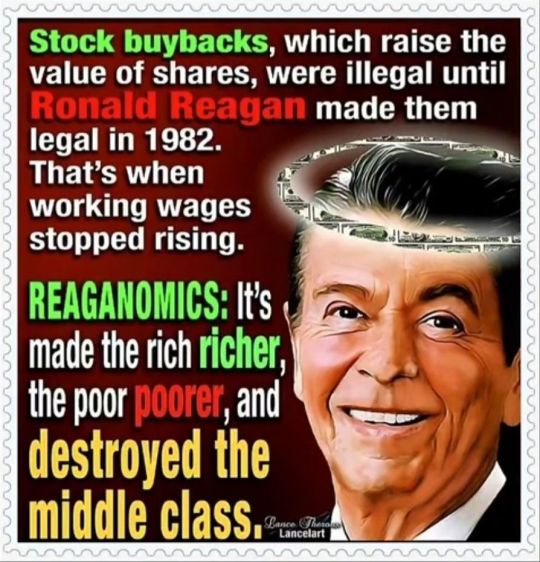

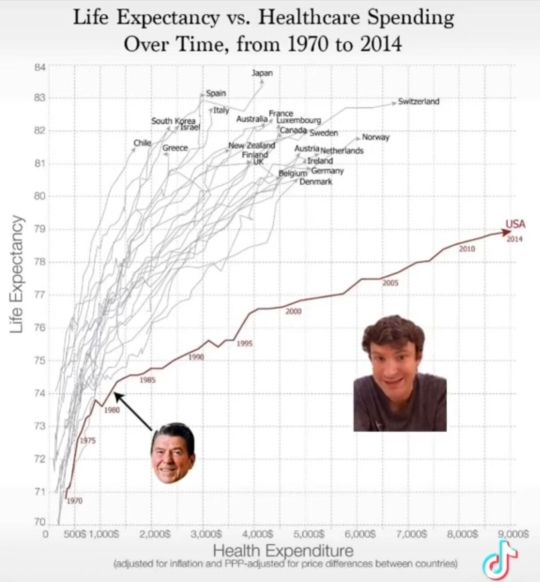


...phew. Made it in under the wire, didn't I?
Happy Reagan Death Day.
(Pt.1)
#united front#meme#anticapitalism#communism#socialism#imperialism#capitalism#free palestine#memes#anti imperialism#antifascism#free sudan#free congo#free yemen#ronald reagan#iran contra#social security#reaganomics#im glad reagan dead#trickle down economics#stock buybacks#2nd amendment#cowboy bebop
18 notes
·
View notes
Text

it's like we know what we're doing or something!
#lemon demon#spirit phone#neil cicierega#digital#artists on tumblr#etsy#sticker sheet#albums#cabinet man#touch tone telephone#reaganomics
24 notes
·
View notes
Text
Everything wrong with America for the past 40 years can be traced directly back to Ronald Reagan. And I dO mean everything
Everything
Everything
#politics#ronald reagan#reaganism#republicans#conservatism#reaganomics#trickle down economics#living wages#inequality
134 notes
·
View notes
Text
Well, as expected, Trump can't keep his focus on policy attacks against the Harris-Walz ticket and keeps wandering off into racist/sexist/bizarre personal attacks. Many say that this is a Trump problem, but I think it's a lot bigger than him in a way that's going to keep hurting Republicans long after he's gone. LONG RANT (TM) time?
INTRODUCTION
I'm sure you've noticed the Very Serious (TM) Republicans like Lindsay Graham and Marco Rubio and Very Serious (TM) conservative media outlets like the Wall Street Journal that keep talking about how Donald Trump would absolutely destroy Kamala Harris in November if only he could keep focused on policy instead of pursuing personal attacks and angry vendettas. Of course, all of them are missing the main reason Trump isn't talking about policy; Republican policy is overwhelmingly unpopular.
Look, I don't give Trump a lot of credit. I don't think he's very intelligent or insightful and I doubt his ability to focus on anything but his own personal vendettas for more than a few minutes, but the man knows popular. You can see him at work at his rallies, he'll start spitballing on something and play with it back and forth with the crowd until he finds something that resonates, it's what he does.
If Trump isn't running on policy, there's a good reason for it. Of course, we should look at specifics to illustrate the issue.
ECONOMICS
To put it bluntly, the Republicans don't have much of an economic policy anymore. Maybe the used to, but that's all gone. There are only two policies they have left, two things you can guarantee will happen under any Republican administration with a minimally compliant Congress: (1) they'll cut taxes for rich people and corporations and (2) they'll try to undo regulations.
That's it, that's all they've got. Now go around and ask people if they think cutting taxes for rich people and corporations is a good idea. I'll bet you don't get many positive responses and you'll get more than few profanities. Even cutting regulations doesn't do so well when you actually get specific about which regulations. People dislike the idea of regulations in general, but they like those regulations that keep the air and water clean.
Now, there was a point where Republican policy had some grounding. Back in the 70s when the Laffer Curve was first proposed, no one knew where the point at the top of the curve was.
(For those who are unaware, the Laffer Curve is the idea that there is some optimal tax rate. Taxing below that rate raises less money for the government, but taxing above that rate also raises less money because it overtaxes the economy. You should look it up, it's a very interesting concept.)
Nowadays, of course, we've got 40+ years of research on it and we have a pretty good idea that the optimum top marginal tax rate is about 70%. In other words, there is, at current tax rates, no way to grow the economy by cutting taxes, but Republicans keep doing it anyways. It's like a zombie policy that's immune to evidence and reason and just keeps on going from sheer inertia.
Of course, that's just the evidence about the economy as a whole. We also know that, starting in the 1980s with a wave of tax cuts and deregulation, worker pay stopped increasing with productivity. In fact, we've seen decades of stagnating wages and increasing income inequality under Republican economic policy to the point where you can actually look at graphs of economic data and point to where Ronald Reagan was elected based on where things started getting bad for average people.
Yet, still, Republicans hold to this economic policy. Despite all of the evidence and the very real consequences it has had for our economy, Republicans cling to the economic policy of Reagan circa 1980 with no interest in creating something new that they could hang their hats on. It really does speak to the state of ideas in the party.
FOREIGN POLICY
And foreign policy? Yeah, Trump can't talk about that either. Dictators like Kim Jong Un and Vladimir Putin aren't very popular and NATO and democratic countries are. Heck, support for Ukraine has fallen since its peak, but it's still more popular than Trump himself.
Maybe there's a case to be made that the views of Cold War-style Republicans like Rubio and Graham who are pro-NATO, pro-Ukraine, and anti-Russia, are popular, but that's not Trump's policy. His foreign policy runs pretty hard against what most Americans think our foreign policy should be.
The one thing in his foreign policy that has even a little bit of positive approval is his plan for tariffs, but even that would fall apart in the details. Most people who support it do so with the vague idea that it would protect US jobs, but how many of them would still support it if they knew how likely it is to turbo-charge inflation? Yeah, I'm pretty sure it'd sink like a lead balloon if he talked about it enough that it actually started getting coverage.
DOMESTIC POLICY
Okay, so there's economic policy, there's foreign policy, and there's domestic policy which basically comes down to "everything else". I'm going to take his domestic policy ideas from Agenda 47, Trump's official campaign site, instead of Project 2025 because Trump is pretending not to know anything about the latter (despite cheerleading it behind the scenes for years), but they're really not all that different.
Trump wants to "certify teachers by their patriotism", abolish teacher tenure, cut funding to any school that doesn't teach subjects the way he wants them to, re-introduce prayer in schools, and close the Department of Education. He wants to establish a commission stocked with conspiracy theorists to investigate autism, he's both approved of and opposed plans to negotiate drug prices, and he's planning to deport tens of millions of undocumented immigrants. He wants to dramatically expand the death penalty, end any government involvement in civil rights, and try to use federal health care money to prevent people from getting transgender surgery even if they pay for it themselves.
None of these things are popular and all of them would be even less so if he actually went around promoting them or worse, tried to actually follow through on them. And Project 2025, which he has disavowed even while maintaining close ties with those who wrote it, is even worse. If you think targeting transgender people polls badly, wait until they come for abortion, birth control, IVF, and pornography.
MESSAGING
You can see all of that in the way that people who only live in a conservative world try to attack liberals. The Wall Street Journal, for example, recently tried to attack Gov. Walz, now Kamala Harris' VP pick, for creating a state system of family and medical leave, providing free college for kids under a certain income threshold, making it easier to vote, and providing school lunches.
These only sound like bad things if you live in a bubble of conservative media that separates you from the real world. Real people love feeding hungry children and letting caretakers take time off to care for loved ones!
POPULARITY
We need to pause for a moment here and address one thing. You see, Trump and Republican's economic policies are unpopular, yet more Americans say they trust Trump to keep the economy strong than trust Harris. How can that be?
Well, there's an old saying (and I'm paraphrasing here) that people are Republicans in theory, Democrats in practice. In other words, they like the vibe of Republicans and they like the sound bites but, once you actually start to talk about the details of any given policy, they don't like Republican ideas at all.
I'm pretty sure that's what's going on here and it's one more big reason Trump doesn't want to talk policy.
CONCLUSION
Look, I get the instinct from Republicans that they'd like their presidential candidate to be more serious, but if they ever want that to happen they're going to have to grapple with the fact that the policies they want are not anything that would ever win an election. Trump is running on personal attacks and vendettas because he knows that these are all way more popular than the actual policies that he and Republicans actually want to put in place if they were to win and the only way to keep any sort of advantage on any policy is to keep it vague.
Until that changes, don't expect any Republican candidate to make a serious policy based argument for their election, even after the age of Trump.
51 notes
·
View notes
Text
Headphones aren't enough, i need every song in this album up my ass

#lemon demon#neil cicierega#spirit phone#lifetime achievement award#touch tone telephone#cabinet man#no eyed girl#when he died#sweet bod#eighth wonder#ancient aliens#soft fuzzy man#as your father i expressly forbid it#i earn my life#reaganomics#man made object#spiral of ants#autism#i love this album#you guys dont even know
186 notes
·
View notes
Text
137 notes
·
View notes
Text

Obey and Consume: The Dystopia of They Live
In this episode, we slip on the sunglasses and see the world as it really is in John Carpenter’s They Live — a cult classic that mashes up anti-capitalist dystopia with cheesy one-liners and 80s action flair. We break down the film’s sharp social commentary on consumerism, class control, and media manipulation, all wrapped in the glorious absurdity of a B-grade sci-fi beatdown.
From six-minute alley fights to secret alien cabals, They Live might just be the smartest dumb movie ever made. Tune in as we explore what makes this film a timeless piece of rebellious pulp cinema.
LISTEN TO THE LATEST EPISODE HERE
Follow us on Instagram @dystopediapod
Follow us on Tumblr @dystopediapod
Email: [email protected]
#johncarpenter#they live 1988#they live#reagan era critique#reaganomics#dystopia podcast#dystopediapod#dystopedia#dystopia#podcast#cultclassic#political commentary
5 notes
·
View notes
Text
Capitalism is broken (Reagan broke it)

Prior to Reagan, stock buy-backs were in fact illegal.
41 notes
·
View notes
Text
if you'd just hold my hand, I'll take you for a ride
42 notes
·
View notes
